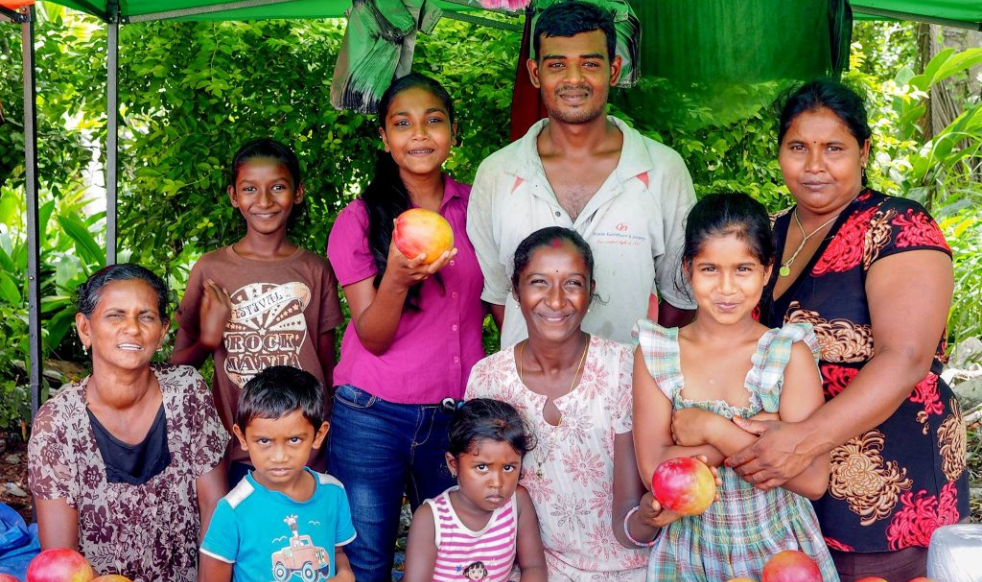Indo-Fijians known as Indian Fijians (also colloquially known as "Findians" or "Findus"), are Fijian citizens of Indian descent, and include people who trace their ancestry to various regions of India and the Indian subcontinent.[7] Although Indo-Fijians constituted a majority of Fiji's population from 1956 through the late 1980s, discrimination and the resulting brain drain resulted in them numbering 313,798 (37.6%) (2007 census) out of a total of 827,900 people living in Fiji as of 2007.[8]
Most Indo-Fijians are the descendants of indentured laborers brought to Fiji during the nineteenth century by the British. In the system of indentured labor, workers (who had been moved to a new country against their will) were forced to perform a job for little or no pay until they earned enough money to buy their freedom. The system was created to provide cheap workers for British colonies after the abolition of slavery in Britain and its colonies in 1833.
The first indentured laborers from India arrived in Fiji in 1879 and the indenture system lasted until 1916. Other immigrants from India arrived in Fiji in the early twentieth century, and they opened small shops in the coastal towns. The Indo-Fijians are part of the south Asian diaspora (a community of ethnically related displaced peoples) that includes the Indian Ocean island of Mauritius, Trinidad in the Caribbean, Guyana in South America, South Africa, and North America.
The Fijian archipelago (string of islands) is located in the western Pacific Ocean. The climate of Fiji is tropical with plenty of rainfall, sunshine, and high humidity. The largest islands within the 800-island group are Viti Levu and Vanua Levu. The vast majority of Indo-Fijians reside on Viti Levu.
Today, Indo-Fijians make up around 43 percent of the total population. Before the military coup of 1987, Indo-Fijians made up close to 48 percent of the total population, but about 5 percent have moved to Australia, Canada, and the United States. In the 1960s, Indo-Fijians outnumbered the indigenous Fijians.
The overwhelming majority of Indo-Fijians speak Fiji Hindustani, or Fiji Hindi. This language developed out of contact between speakers of different dialects of Hindi/Urdu (one of the native languages of India) and their bosses on the colonial-era sugar plantations. Although Indian laborers could communicate fairly well, they had some difficulty at times being understood. Over time, a unified dialect emerged. Since then, it has become the language of Indo-Fijian identity.
The folklore of the Indo-Fijians derives from traditional Indian folklore. Important epic stories and myths such as the Rāmāyana and the Mahābhārata are read, chanted, and recounted by Indo-Fijians at ceremonies and celebrations. The epic drama of Rama and Sita is performed at most religious festivals.
The Indian laborers brought their religions with them to Fiji. Hinduism and Islam both exist on Fiji today, alongside Christianity and traditional forms of Fijian religious practice. The majority of the indentured laborers moved to Fiji were Hindu. As a result, Hinduism is the major religion among Indo-Fijians.
Hinduism is a polytheistic religion, meaning Hindus believe in a variety of gods. Each god has specific characteristics, functions, and powers. There are sects that are devoted to the worship of a particular god and shrines are created to provide offerings. These practices continue among the Indo-Fijian communities in Fiji and abroad.
Major holidays for Indo-Fijians center on the religious calendars. Hindus celebrate Diwali (the festival of lights) in early November and Holi (a festival of singing and light-hearted play). Families also sponsor pujas, which are ceremonies that include prayers, offerings, and feasts. Pujas take place on birthdays and other special occasions when it is appropriate to give thanks for good fortune and blessings. Muslim Indo-Fijians observe the fasting and prayer practices during the month of Ramadan. Other secular holidays include the Queen's Birthday, Boxing Day, and Fiji Day.
Many jobs in Indo-Fijian society are traditionally done by males only. Musicians, religious leaders, and cooks for public functions like weddings and pujas (worship ceremonies) are almost always men. Male children are usually preferred over female children. Male children are also usually given much more freedom and independence than females.
In most traditional societies of India, marriages are arranged by parents. In some cases, the couple has no say in the matter. In recent years, this system has become less rigid and couples have more choice in their selection of mates. Male offspring generally inherit the majority of their parents' property and are expected to divide it among themselves.

 1,714 Views
1,714 Views 0 comments
0 comments
Comments